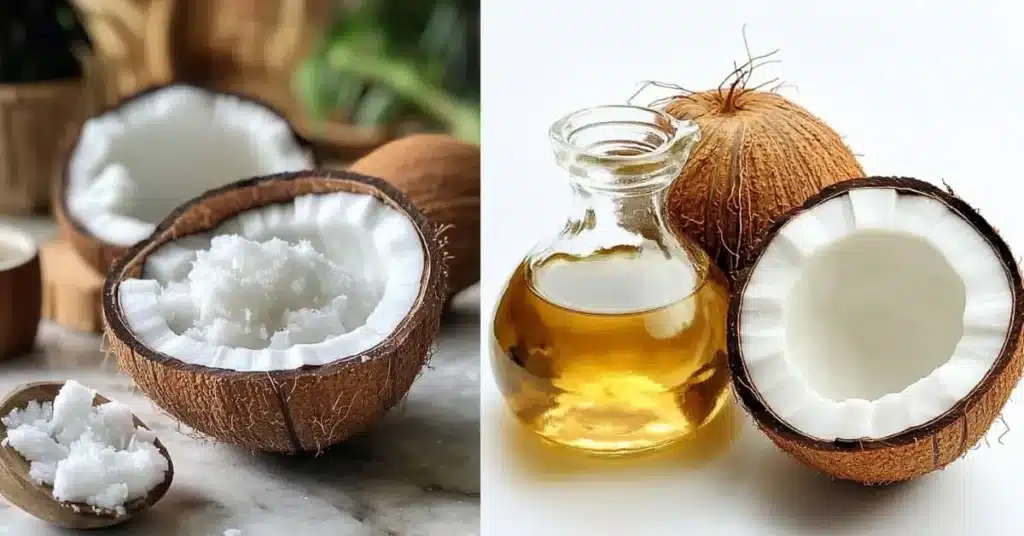Coconut oil has surged in popularity over the past few years, becoming a staple in many kitchens and beauty routines. Traditionally, several Pacific and Asian countries use it as a primary source of fat. However, as you navigate the grocery store aisles, you may wonder: Is refined coconut oil the same as coconut oil? Understanding the differences between processed and natural forms of coconut oil can help you decide which type is best suited for your needs.

The short answer is no; the refined version is not the same as the unrefined type. They differ in production methods, flavor, smoke point, and best use cases. Nevertheless, both have unique benefits. Choosing between them depends on how you intend to use the oil. Let’s delve into these differences in detail and explore how to incorporate each into your cooking, skincare, and overall lifestyle.
Overview of Coconut Oil
Coconut oil stands out for its unique properties. Unlike many other cooking oils, it is solid at room temperature due to its high saturated fat content. It is rich in medium-chain triglycerides (MCTs) and lauric acid, which link to various health benefits like weight management, improved cholesterol levels, and antimicrobial properties. Its versatility has led to its widespread use in cooking, baking, skincare, and even as a dietary supplement in certain regimens, such as the keto diet.
The Role of Coconut Oil in Cooking and Baking
In the kitchen, coconut oil shines for its high smoke point and rich flavor profile. When cooking at high temperatures, you need to choose an oil that’s suitable for high-temperature cooking to prevent the breakdown of fats and the formation of harmful compounds. The refined form often takes center stage for this purpose due to its higher smoke point. On the other hand, the virgin type is chosen for its flavor in recipes where a coconut taste is desired.
Coconut Oil as a Vegan Alternative to Butter
In vegan baking, coconut oil serves as a vegan alternative to butter. Its solid state at room temperature makes it an excellent substitute for butter, contributing to the flaky texture in biscuits and pie crusts. Its use extends beyond pastries. You can use it in various baked goods, from cookies to cakes. For instance, the blue eyes coconut cake recipe is a fluffy coconut dessert that showcases how the unprocessed version can enhance flavor and texture.
Refined vs. Unrefined Coconut Oil: Basic Differences
The primary difference between the processed and unprocessed versions lies in their production methods. This distinction influences their flavor, scent, smoke points, and nutritional content to some extent.
- Refined Coconut Oil: This form undergoes additional processing steps, such as bleaching and deodorizing. These processes result in a neutral flavor and a higher smoke point. It’s ideal for high-temperature cooking and situations where a neutral taste is desired.
- Unrefined Coconut Oil: Also known as virgin coconut oil, this type is minimally processed. It retains its natural coconut flavor and aroma, along with a lower smoke point. This oil is suitable for dishes where a coconut flavor is preferred and for low to medium heat cooking.
Unrefined Coconut Oil: Production and Characteristics
Production Methods
The unprocessed form involves minimal processing to retain its natural qualities. Producers use two primary methods:
- Dry Extraction: This method involves pressing oil from dried coconut flesh, known as copra. The dried coconut meat undergoes pressing to extract the oil, which is then filtered to remove impurities. This process maintains the oil’s natural flavor and aroma.
- Wet Extraction: This method presses both coconut milk and oil from fresh coconuts. Separation of the oil from the milk occurs through fermentation, chilling, or enzymatic action. Often, wet extraction results in a product labeled as “cold-pressed,” indicating that no heat was used during extraction. This method preserves more of the coconut’s natural nutrients and flavor.
Characteristics of the Unrefined Version
- Flavor and Scent: Unprocessed coconut oil has a strong coconut flavor and aroma. This oil becomes a popular choice for recipes where you want the coconut taste, such as curries, baked goods, and tropical smoothies.
- Smoke Point: The smoke point of this type is around 350°F (177°C). It is suitable for low to medium heat cooking, such as sautéing vegetables or baking.
- Appearance: At room temperature, the unrefined version remains solid and creamy. Its white color can add a creamy texture to dishes like coconut cakes.
Nutritional Benefits of the Unrefined Option
The natural form is rich in naturally occurring nutrients, including antioxidants, vitamins, and minerals. Since the production process involves minimal processing, the oil retains most of these beneficial compounds. This makes it a popular choice for health-conscious individuals. Additionally, the high content of lauric acid in this type offers antimicrobial and antiviral properties, which can help boost the immune system.
Refined Coconut Oil: Production and Characteristics
Production Process
The refined type undergoes a more extensive refining process to remove impurities, resulting in a neutral-tasting oil with a higher smoke point. The refining process typically includes the following steps:
- Degumming: Degumming removes gums that can alter the oil’s texture and shelf life. The oil mixes with a degumming agent and then gets washed to separate the gums.
- Neutralizing: Sodium hydroxide neutralizes free fatty acids, which are prone to oxidation and can cause the oil to go rancid. This process helps extend the oil’s shelf life.
- Bleaching: Filtration through activated clay removes any impurities and discoloration. It’s important to note that the term “bleaching” refers to filtering the oil to make it clearer and does not involve bleach.
- Deodorizing: Heating the oil to high temperatures evaporates volatile compounds responsible for odor and flavor, removing any remaining coconut scent or taste.
Characteristics of the Refined Option
- Flavor and Scent: This processed oil has a mild or neutral flavor and scent. This characteristic makes it a versatile option for recipes where a coconut flavor is not desired, such as stir-fries, sautéed vegetables, and baked goods.
- Smoke Point: With a smoke point of 400-450°F (204-232°C), the refined option is ideal for high-heat cooking, including frying, roasting, and baking.
- Appearance: Refined coconut oil can be liquid at slightly higher temperatures. Its neutral appearance and texture make it a suitable choice for a wide range of culinary applications.
Nutritional Impact of Refining
The refining process slightly reduces the nutrient content of coconut oil, as some vitamins and polyphenols are lost. However, the processed version still retains a good amount of healthy fats, including MCTs, which provide quick energy and may aid in weight management. Although refined coconut oil has fewer antioxidants than its unrefined counterpart, it remains a valuable source of dietary fat.
Nutritional Profile Comparison
Both types share a similar nutritional profile in terms of fat content and calorie count:
- Calories: Each tablespoon of coconut oil (14 grams) contains approximately 120 calories.
- Fat Content: Both types are composed primarily of saturated fats, with a significant portion being medium-chain triglycerides (MCTs). These fats metabolize differently than long-chain fats, providing a quick source of energy and promoting fat oxidation.
- Lauric Acid: Both versions contain lauric acid, a fatty acid known for its potential health benefits, including antimicrobial properties and cholesterol support.
Despite the slight nutrient loss during the refining process, both types of coconut oil offer similar health benefits. Therefore, the choice between the refined and natural varieties often comes down to personal preference and intended use.
Cooking and Baking with Coconut Oil
Coconut oil is highly versatile in the kitchen. Its use depends largely on the type of oil you choose—refined or unrefined—and the specific dish you’re preparing.
Unrefined Coconut Oil in Cooking and Baking
- Best for:
- Low to Medium Heat Cooking: This oil’s lower smoke point makes it ideal for sautéing vegetables, simmering sauces, and preparing dishes like curries.
- Baking: It imparts a rich coconut flavor to baked goods, making it perfect for recipes like coconut macaroons, cakes, and tropical-inspired desserts.
- Limitations:
- Lower Smoke Point: At 350°F (177°C), this version’s smoke point does not suit high-heat cooking methods like deep-frying. Heating it beyond its smoke point can lead to the formation of harmful free radicals.
Tips for Using Unrefined Coconut Oil
- Flavor Profile: The natural version has a pronounced coconut flavor, so it pairs well with dishes that complement this taste, such as Asian and Caribbean cuisine.
- Solid State: At room temperature, unprocessed coconut oil is solid, making it an excellent substitute for butter in baking. Use it in a coconut cake recipe for a moist, flavorful dessert.
Refined Coconut
Oil in Cooking and Baking
- Best for:
- High Heat Cooking: With a smoke point of 400-450°F (204-232°C), the refined type is perfect for high-heat cooking methods such as stir-frying, roasting, and deep-frying. Its neutral flavor makes it a versatile choice for savory dishes.
- Neutral Flavor: Because it lacks the strong coconut taste of its unrefined counterpart, the refined oil can be used in dishes where you don’t want the flavor of coconut to dominate.
- Advantages:
- Higher Smoke Point: Its higher smoke point allows you to cook at higher temperatures without the risk of the oil burning or smoking.
Tips for Using Refined Coconut Oil
- Versatility: Use refined coconut oil in savory dishes like stir-fries, roasted vegetables, or casseroles. For a delicious meal, try it in the ham and hashbrown casserole for a crisp, golden finish.
- Neutral Profile: This type’s lack of flavor means it won’t interfere with the taste of your dish, making it a great all-purpose cooking oil.
Other Uses of Coconut Oil
Coconut oil’s benefits extend beyond the kitchen. Its moisturizing properties and nutrient content make it a popular choice in skincare, hair care, and dietary practices.
Unrefined Coconut Oil for Skin and Hair Care
- Skin Care: Unprocessed coconut oil often becomes a favorite for natural skin care routines. Its high content of fatty acids and antioxidants makes it an excellent moisturizer for dry skin, lips, and cuticles. It also acts as a protective barrier, locking in moisture and soothing irritated skin. Many people use it as a natural makeup remover, massage oil, or base for homemade skincare products like scrubs and lotions.
- Hair Care: When applied to hair, this natural oil helps reduce protein loss, strengthen the hair shaft, and promote shine. It’s especially beneficial for dry or damaged hair. You can use it as a pre-shampoo treatment, a deep conditioner, or a frizz-tamer.
Refined Coconut Oil for Skin and Hair Care
- Neutral Scent: For those who prefer a less aromatic product, the refined version works well in skin and hair care. It offers similar moisturizing benefits without the strong coconut scent, making it suitable for individuals sensitive to fragrances.
- Gentle on Skin: Refined coconut oil is often less likely to cause skin irritation, making it a good option for those with sensitive skin or allergies. Use it as a body moisturizer, massage oil, or base for homemade skincare products.
Dietary Preferences and Coconut Oil
- Keto Diet: Coconut oil is a popular choice for individuals following a ketogenic diet due to its high content of MCTs. These fats metabolize quickly by the liver, providing an immediate source of energy and aiding in fat-burning processes. Use both refined and unrefined coconut oils in keto-friendly recipes, such as bulletproof coffee, fat bombs, and stir-fries.
- Whole Food Diet: Those who focus on consuming minimally processed foods usually prefer the natural version. Its minimal processing preserves more of the coconut’s natural nutrients, making it a more wholesome option.
Pros and Cons of Refined and Unrefined Coconut Oil
Refined Coconut Oil
- Pros:
- Higher Smoke Point: Suitable for high-heat cooking.
- Neutral Flavor: Versatile for both sweet and savory dishes.
- Longer Shelf Life: The refining process extends the oil’s shelf life by removing impurities.
- Cons:
- More Processed: Refining reduces some of the oil’s natural nutrients and antioxidants.
- Fewer Health Benefits: The removal of some beneficial compounds during processing may reduce its overall health impact.
Unrefined Coconut Oil
- Pros:
- Less Processed: Retains more of the natural nutrients, including antioxidants and lauric acid.
- Rich Coconut Flavor: Ideal for dishes where a coconut taste is desired.
- Natural Skincare: Suitable for skin and hair care due to its natural moisturizing properties.
- Cons:
- Lower Smoke Point: Not suitable for high-heat cooking.
- Strong Flavor: The coconut taste may not suit all dishes.
Common Myths and Misconceptions
Coconut oil has been the subject of numerous myths and misconceptions. Here, we debunk some of the most common ones:
- Myth: Refined coconut oil is unhealthy.
- Fact: Although refined coconut oil undergoes more processing than unrefined coconut oil, it is not inherently unhealthy. The refining process removes impurities and extends the oil’s shelf life, making it more versatile for cooking. It still contains healthy fats and MCTs that provide energy and support metabolism.
- Myth: Unrefined coconut oil is always better.
- Fact: Unrefined coconut oil retains more natural nutrients and flavor, making it a great choice for certain uses. However, it may not always be the best option, especially for high-heat cooking. You should choose between refined and unrefined coconut oil based on the specific application and personal preference.
- Myth: Coconut oil raises cholesterol and is bad for heart health.
- Fact: Coconut oil contains saturated fats, but studies suggest it may have a neutral or even positive effect on heart health. The lauric acid in coconut oil may help raise HDL (good) cholesterol, which can support cardiovascular health. However, like all fats, it should be consumed in moderation as part of a balanced diet.
FAQs
- Which is healthier, refined or unrefined coconut oil?
- Both are healthy in their own ways. Unrefined coconut oil retains more natural nutrients and flavor, while refined coconut oil is more versatile for high-heat cooking. The choice depends on your specific needs and preferences.
- Can you use refined coconut oil for skincare?
- Yes, refined coconut oil works well for skincare, especially if you prefer a neutral scent. It offers moisturizing benefits similar to unrefined coconut oil, making it suitable for those with sensitive skin.
- Is refined coconut oil still natural?
- Yes, refined coconut oil remains a natural product, although it undergoes more processing than unrefined coconut oil. The refining process removes impurities and neutralizes the flavor, resulting in a more versatile oil for cooking and baking.
- Does refined coconut oil contain trans fats?
- No, refined coconut oil does not contain trans fats. The refining process does not hydrogenate the oil, so it remains free of harmful trans fats.
- Can you use unrefined coconut oil for frying?
- Unrefined coconut oil is not ideal for frying due to its lower smoke point (350°F/177°C). For high-heat cooking like frying, refined coconut oil is a better choice because of its higher smoke point.
Conclusion
While the refined and unrefined forms of coconut oil share similar nutritional profiles, they differ significantly in flavor, smoke point, and processing methods. Choosing between the two depends on your needs—whether you’re cooking at high temperatures, baking, or using coconut oil for skincare. Both forms are versatile and can be valuable additions to your kitchen or beauty routine. The refined type offers a neutral flavor and higher smoke point, making it suitable for various cooking methods, while the unrefined version provides a rich coconut taste and more natural nutrients for those seeking less processed options.


